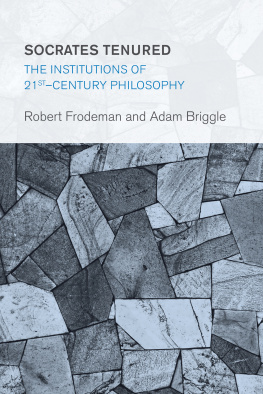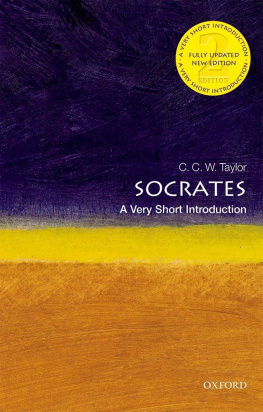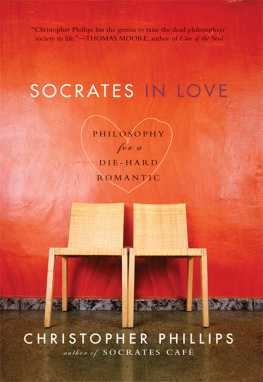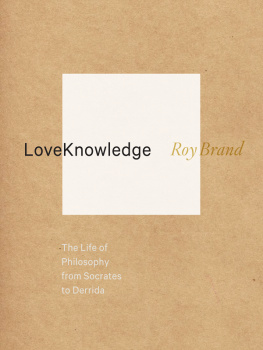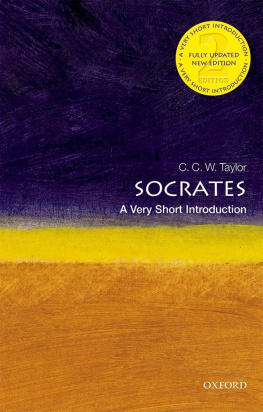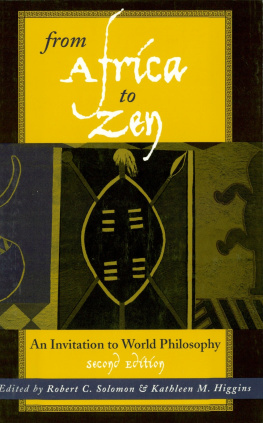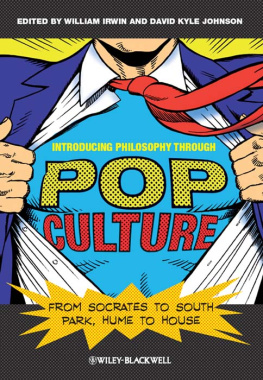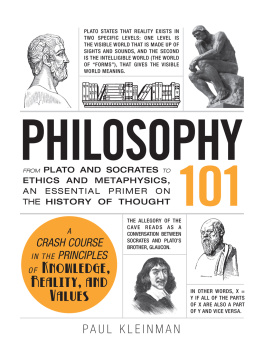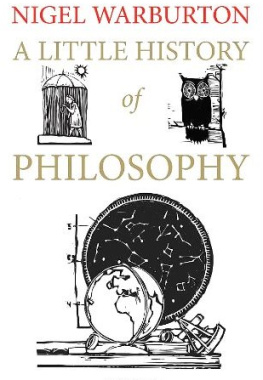Robert Frodeman - Socrates Tenured: The Institutions of 21st-Century Philosophy
Here you can read online Robert Frodeman - Socrates Tenured: The Institutions of 21st-Century Philosophy full text of the book (entire story) in english for free. Download pdf and epub, get meaning, cover and reviews about this ebook. year: 2016, publisher: Rowman & Littlefield, genre: Religion. Description of the work, (preface) as well as reviews are available. Best literature library LitArk.com created for fans of good reading and offers a wide selection of genres:
Romance novel
Science fiction
Adventure
Detective
Science
History
Home and family
Prose
Art
Politics
Computer
Non-fiction
Religion
Business
Children
Humor
Choose a favorite category and find really read worthwhile books. Enjoy immersion in the world of imagination, feel the emotions of the characters or learn something new for yourself, make an fascinating discovery.
- Book:Socrates Tenured: The Institutions of 21st-Century Philosophy
- Author:
- Publisher:Rowman & Littlefield
- Genre:
- Year:2016
- Rating:5 / 5
- Favourites:Add to favourites
- Your mark:
- 100
- 1
- 2
- 3
- 4
- 5
Socrates Tenured: The Institutions of 21st-Century Philosophy: summary, description and annotation
We offer to read an annotation, description, summary or preface (depends on what the author of the book "Socrates Tenured: The Institutions of 21st-Century Philosophy" wrote himself). If you haven't found the necessary information about the book — write in the comments, we will try to find it.
Socrates Tenured: The Institutions of 21st-Century Philosophy — read online for free the complete book (whole text) full work
Below is the text of the book, divided by pages. System saving the place of the last page read, allows you to conveniently read the book "Socrates Tenured: The Institutions of 21st-Century Philosophy" online for free, without having to search again every time where you left off. Put a bookmark, and you can go to the page where you finished reading at any time.
Font size:
Interval:
Bookmark:
Socrates Tenured
Collective Studies in Knowledge and Society
Series Editor
James H. Collier is Associate Professor of Science and Technology in Society at Virginia Tech.
This is an interdisciplinary series published in collaboration with the Social Epistemology Review and Reply Collective. It addresses questions arising from understanding knowledge as constituted by, and constitutive of, existing, dynamic and governable social relations.
The Future of Social Epistemology: A Collective Vision , edited by James H. Collier
Social Epistemology and Technology: Toward Public Self-Awareness Regarding Technological Mediation , edited by Frank Scalambrino
Socrates Tenured: The Institutions of Twenty-First-Century Philosophy , by Robert Frodeman and Adam Briggle
Social Epistemology and Epistemic Agency , edited by Patrick J. Reider
Socrates Tenured
The Institutions of Twenty-First-Century Philosophy
Robert Frodeman and Adam Briggle

London New York
Published by Rowman & Littlefield International Ltd
Unit A, Whitacre Mews, 26-34 Stannary Street, London SE11 4AB
www.rowmaninternational.com
Rowman & Littlefield International Ltd.is an affiliate of Rowman & Littlefield
4501 Forbes Boulevard, Suite 200, Lanham, Maryland 20706, USA
With additional offices in Boulder, New York, Toronto (Canada), and Plymouth (UK)
www.rowman.com
Copyright 2016 by Robert Frodeman and Adam Briggle
All rights reserved . No part of this book may be reproduced in any form or by any electronic or mechanical means, including information storage and retrieval systems, without written permission from the publisher, except by a reviewer who may quote passages in a review.
British Library Cataloguing in Publication Data
A catalogue record for this book is available from the British Library
ISBN: HB 978-1-7834-8309-9
PB 978-1-7834-8310-5
Library of Congress Cataloging-in-Publication Data Available
ISBN 978-1-7834-8309-9 (cloth : alk. paper)
ISBN 978-1-7834-8310-5 (pbk. : alk. paper)
ISBN 978-1-7834-8311-2 (electronic)
 The paper used in this publication meets the minimum requirements of American National Standard for Information SciencesPermanence of Paper for Printed Library Materials, ANSI/NISO Z39.48-1992.
The paper used in this publication meets the minimum requirements of American National Standard for Information SciencesPermanence of Paper for Printed Library Materials, ANSI/NISO Z39.48-1992.
Printed in the United States of America
Contents
Wed like to acknowledge the generous support of the National Science Foundation (NSF). Two grants have contributed to the research in this book:
Award #1353796, A Study of How Philosophy Research and Practice Can Better Contribute to STEM Research and to Public Policy.
Award #1445121, EAGER: Research on the Broader Impacts of Basic Science: Gauging the State of the Art.
We also express our thanks to Kelli Barr, who has helped us with both grants, and provided a great deal of the data behind our empirical analysis.
This work forms part of a continuing conversation among friends and colleagues. Without holding them responsible for any of the following, we would like to thank: Evelyn Brister, Keith Wayne Brown, Steve Fuller, Britt Holbrook, Eunice Nicholson, Michael ORourke, and David Budtz Pedersen.
Philosophy has never been comfortable with its status as a discipline in the academy. Even today, the philosophers who most students read in their courses were non-academics: Plato, Descartes, Hume, Mill. In fact, Kant had to dragoon philosophy into the academy to stop the squabbling of the doctors of theology, medicine, and law, which was threatening to tear asunder the late eighteenth-century university. His famous late essay, The Contest of the Faculties (1798), set the stage in the nineteenth and early twentieth centuries for philosophy to define the terms on which all knowledge claims might be transacted. The philosopher would be, in effect, the intellectual underwriter for the academy.
Admittedly, the exact nature of this role underwent considerable change from the time of Kants immediate followers, the German idealists, to its final robust incarnation in the logical positivist movement. What they all shared, however, was a commitment to the philosopher as someone who in his or her own person resolved the contradictory claims made by various academicians. Goethe was often cited as the exemplar who, in this sense, lived philosophically. Of course, academic philosophers continue to pay tribute to this lineage in fields called epistemology and philosophy of science. However, todays versions are paler, more inward-looking versions of what had animated Kant. Indeed, Kant would be disappointed by the extent to which the institutionally dominant analytic school of philosophy appears to have been captured by the very academicians who he would have philosophers domesticate, if not dominate.
Socrates Tenured is most naturally read as mounting a wholesale attack on this decadent state of academic philosophy. But a deeper reading of the book suggests that its authors, the environmental philosophers Robert Frodeman and Adam Briggle, may object to Kants very tasking of philosophy with the harmonization of academic knowledge production. After all, our authors self-identify as field philosophers (as in field researchers). For them, philosophys big sociological mistake was to become captive to the emerging research university in the late nineteenth century, whereby specialized doctoral-level training in philosophy became the benchmark of philosophical competence. This started the drive towards inwardness, which has resulted in contemporary academic philosophy being so difficult to fathom, even by interested and otherwise well-informed non-professionals. Frodeman and Briggle go still further: for them this inward turn has spelt the end of philosophy as virtuous inquiry and the philosopher as someone who by his or her own practice lives some version of a life worth living.
When Frodeman and Briggle debuted this argument in January 2016 in The Stone , The New York Times philosophy column, the noted historian of analytic philosophy, Scott Soames, responded by reasserting that philosophys natural home is its current one, the academy. Soamess view is widely shared by professional philosophers. Unsurprisingly, perhaps, Soames argued from his own expertise, namely, the study of language, logic, and science within analytic philosophy. That Soamess glaring sampling bias has been so easily granted by his philosophical colleagues unwittingly supports Frodeman and Briggles point about the inward-looking nature of the field.
A striking move in Soamess argument is his quick distinction between the theoretical side of philosophy (i.e. the concern with language, logic, and science) and the practical side (i.e. the concern with goodness, justice, and virtue) on the basis of which he judges the former to have been always more important than the latter to the development of philosophy. This move is a signature feature of just the sort of institutionalization that Frodeman and Briggle decry. Call it the Neo-Kantian settlement, after how Kants followers increasingly thought about philosophy as an academic subject in the nineteenth century. The basic Neo-Kantian idea is that philosophers cannot speak sensibly about the ends of things (i.e. the practical side), but they can say much of value about what follows from presuming certain ends and perhaps even what might facilitate those ends (i.e. theoretical side).
Soamess defence of academic philosophy proceeds by showing the many ways mainly in the twentieth century in which philosophy and the special sciences have worked in a mutually enriching fashion. This is supposed to show that far from indulging in academic navel-gazing, philosophers have been both receptive and contributory to the work of other disciplines. Yet, in all the cases cited by Soames, philosophy is operating in what John Locke (cited by Soames approvingly) called an underlabouring capacity: The other disciplines provide the ends, and philosophy then supplies or refines the means. Such is the Neo-Kantian settlement in action. Even when Soames cites philosophers who revolutionized other disciplines, his examples are limited to the philosopher-mathematicians Gottlob Frege, Bertrand Russell, and Kurt Gdel, as if to suggest that philosophy had some natural affinity with pure thought, detached from human ends, which might make it especially well-suited to the mathematical disciplines.
Next pageFont size:
Interval:
Bookmark:
Similar books «Socrates Tenured: The Institutions of 21st-Century Philosophy»
Look at similar books to Socrates Tenured: The Institutions of 21st-Century Philosophy. We have selected literature similar in name and meaning in the hope of providing readers with more options to find new, interesting, not yet read works.
Discussion, reviews of the book Socrates Tenured: The Institutions of 21st-Century Philosophy and just readers' own opinions. Leave your comments, write what you think about the work, its meaning or the main characters. Specify what exactly you liked and what you didn't like, and why you think so.

